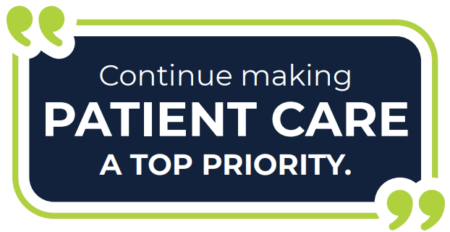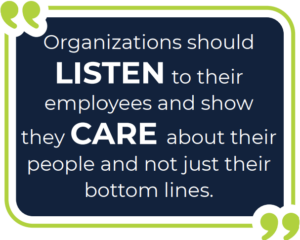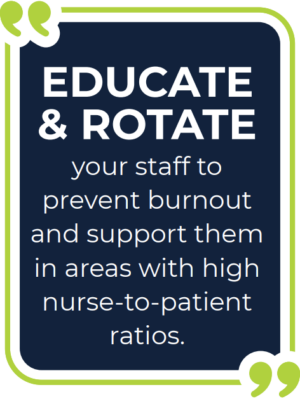By Jennifer Melham
As healthcare leaders, it’s important to recognize the transitions nurses have had to make from before the COVID pandemic until now. These changes have impacted everything from staffing shortages and caregiver burnout to hiring and retention strategies.
It’s up to healthcare leaders to collaborate and listen to the business needs of their organization. Just as importantly, we must listen to the voices of these caregivers. We did this in our latest Voices of Care Survey Report of core nursing staff (also called permanent nurses) working as RNs and APRNs. This survey aimed to further inform and educate healthcare facilities on their characteristics, attitudes, and behaviors, compared to travel and per diem staff, to understand what’s important in recruiting and retaining nurses.
Getting to Know Core Nursing Staff
In the U.S., most nurses working at the bedside, or core nursing staff, are female, and the highest concentration of survey respondents was in the 30-49 age group, so mostly millennials and Gen X. Understanding the mindset of this demographic is essential for healthcare organizations as they work to hire and retain staff moving forward.
So, what keeps nurses in facilities versus choosing to work as travelers or take PRN roles?
- 64% of our respondents are married, and 49% have dependents, with 69% of total respondents citing “being with family” as a consistently important reason they choose permanency.
- Other factors cited as “very important” reasons to select permanency include a consistent income and a preference to live at home.
- Core nursing staff also prefer working with the same team, having consistent policies and opportunities for career development.

Core nursing staff value patient care and are motivated to ensure their patients’ positive outcomes. Therefore, they feel they need appropriate staffing levels and a healthy work-life balance to be at their best.
Lastly, while not as important of a factor, some nurses also reported that they chose permanency because the focus of their current role lent itself to a permanent setting, plus some noted that traveling can be stressful.
What Core Nurses Think About Where They Work
Most of our respondents (70%) work in a hospital setting, with 89% working in direct care. Healthcare leaders need to note where their staff prefer to work, but more importantly, you should look at why.
After all, our survey found that 17% percent of core nursing staff plan to transition into travel nursing, and 16% plan to seek new work at a new employer. Only 27% of these respondents feel they are paid fairly for their work. Higher pay is a leading motivation for potential departure. Other reasons for leaving their current roles or even leaving the nursing profession altogether include:

- Feeling undervalued or unsupported by their organization.
- No longer finding their career rewarding.
- Experiencing job-related mental health issues, stress, or burnout.
The question then becomes, “How can we keep these clinicians from leaving?”
As with most professions, this requires a good hard look at what attracts qualified candidates and helps organizations keep highly skilled staff. It also requires looking at the generational differences among your staff.
Addressing Mental Health and Burnout
“Core nursing staff in the 60+ age group tend to have an easier time with work, particularly when it comes to feeling recognized. They also have a lesser need for employer-provided mental health support. This speaks to what different generations expect and value, with millennials and Gen Z emphasizing their mental health concerns.” – Patti Artley, Medical Solutions CNO
As found in our survey, as traditionalists and baby boomers begin to retire, it creates a demand for new nurses, which this younger generation will fill in the coming years. This, combined with their value on mental health, will be an important recruitment strategy as it highlights the need for flexibility and addressing mental health and burnout in the nursing industry.
Your facility can take small steps right away to help, such as:
- Encouraging nurses to prioritize self-care.
- Prioritizing mentorship in the workplace.
- Understanding and forecasting labor needs.
- Providing adequate mental health support.
- Adding flexible work schedules.
- Improving staffing ratios to safer levels.
- Offering full health and wellness benefits.
- Providing fair and equal pay in alignment with experience.
Our survey further defines the attitudes of core nursing staff by age group and by how strongly they agree with statements such as “My work is rewarding and meaningful,” “I am normally respected and heard at work,” “I normally feel valued by the facility I work at,” and more.

Last but certainly not least, our nation’s core nursing staff value career development opportunities. Our survey respondents, no matter the age group, noted that they prefer specialized skills training, classes, and support for specialty certifications when it comes to their professional goals. Naturally, those in the 60+ age category prioritized things like tuition reimbursement less than their millennial and Gen X counterparts, but across generations, nurses want to see mentorship and a focus on education in the industry.
To successfully engage with core nurses and be an attractive place of employment in today’s market, leaders must listen to their staff, provide fair pay, improve staffing ratios, and provide schedule flexibility while offering health benefits and mental health support.
This is a recap of Voices of Care: Understanding Our Nation’s Caregivers 2022 Survey of Nurses – Core Nursing Staff Edition, independently run by Medical Solutions to illustrate the attitudes and priorities of permanent nurses in facilities and organizations throughout the country. To learn more, contact Medical Solutions today!
Jennifer Melham is a Content Specialist for Medical Solutions